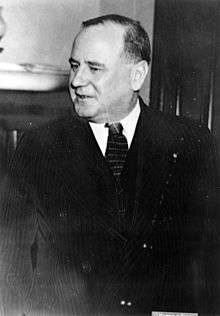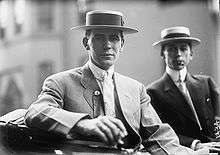Bennett Champ Clark
| Bennett Champ Clark | |
|---|---|
 | |
| Judge of the United States Court of Appeals for the District of Columbia Circuit | |
|
In office September 28, 1945 – July 13, 1954 | |
| Nominated by | Harry S. Truman |
| Preceded by | Thurman Arnold |
| Succeeded by | Walter Maximillian Bastian |
| United States Senator from Missouri | |
|
In office February 3, 1933 – January 3, 1945 Serving with Roscoe C. Patterson, Harry S. Truman | |
| Preceded by | Harry B. Hawes |
| Succeeded by | Forrest C. Donnell |
| Personal details | |
| Born |
January 8, 1890 Bowling Green, Missouri |
| Died |
July 13, 1954 (aged 64) Gloucester, Massachusetts |
| Resting place | Arlington National Cemetery |
| Nationality | United States |
| Political party | Democratic |
| Alma mater |
University of Missouri George Washington University Law School |
| Occupation | Lawyer |
| Military service | |
| Service/branch | United States Army |
| Years of service | 1917–1919 |
| Rank | Colonel |
| Unit |
35th Division 88th Division |
| Battles/wars | World War I |
Joel Bennett Clark (January 8, 1890 – July 13, 1954), better known as Bennett Champ Clark, was a Democratic United States Senator from Missouri from 1933 until 1945, and was later a United States federal judge.
Early life


Bennett Clark was born into a political family. The son of Champ Clark, who the only Missourian to ever serve as Speaker of the House, and was a prominent Democratic Party leader of the early 20th century, both he and his sister, Genevieve Clark Thomson, would go on to have political careers. Bennett Clark was born in Bowling Green, Missouri, and was raised and educated in Bowling Green and Washington, DC.
Clark graduated from the University of Missouri in Columbia, Missouri (B.A.) in 1912. In 1914, he graduated from The George Washington University Law School with an LL.B.
Early career
Clark became parliamentarian of the United States House of Representatives in 1913, while still in law school. He served until 1917, when he resigned in order to join the United States Army for World War I.
Military service
Clark joined the United States Army in 1917, and completed Citizens' Military Training Camp training at Fort Myer, Virginia, and was commissioned as a captain. He was then elected lieutenant colonel and second in command of the 6th Missouri Infantry Regiment, a unit of the Missouri National Guard. This unit was subsequently called to federal service as the 140th Infantry Regiment, a unit of the 35th Division. After arriving in France, Clark served on the headquarters staffs of both the 35th and 88th Divisions.
In 1919, Clark was promoted to colonel while serving in the post-war Army that occupied Germany. He was an organizer of the first American Legion convention in Paris, and was elected as the organization's first national commander. After leaving the Army in 1919, Clark maintained a lifelong active interest in the 35th Division Veterans Association, the American Legion, and the Veterans of Foreign Wars. From 1919 to 1922, Clark served as president of the National Guard Association of the United States.
Continued career
In 1919, Clark began practicing law in St. Louis, Missouri. In the 1920s he researched and authored a biography of John Quincy Adams, and was active in politics as a campaign speaker for Democratic candidates in Missouri. In 1928 he considered running for the U.S. senate seat of the retiring James A. Reed, but decided not to make the race.
United States Senator
In the 1932 election, Clark ran for the U.S. Senate seat held by the retiring Harry B. Hawes, and relied on his base among veterans to defeat two other candidates for the Democratic nomination. Clark defeated Henry Kiel in the general election for the term beginning March 4, 1933. Hawes resigned on February 3, 1933, a month before his term was to end, and Clark was appointed to fill the vacancy, gaining seniority on other senators elected in 1932. Clark was re-elected in the 1938 election, and served from February 3, 1933 to January 3, 1945. In 1944, Clark was an unsuccessful candidate for renomination, losing the Democratic primary to Roy McKittrick, who lost the general election to Republican Forrest C. Donnell.
In April 1943 a confidential analysis by British scholar Isaiah Berlin of the Senate Foreign Relations Committee for the British Foreign Office succinctly characterized Clark as, in his strongly partisan view:
a rabid isolationist and member of the American First Committee who has steadily voted against all the foreign policies and war measures of the Administration with the exception of the reciprocal trade agreements (in which the corn exporters of Missouri have some interest). A member of the Wheeler-Nye-[Robert A.] Taft coterie. An avowed Anglophobe.[1]
Clark is perhaps most famous for declaring that Emperor Hirohito should be hanged as a war criminal on the senate floor on January 29, 1944. In the same year, he was the first senator to introduce the G.I. Bill proposal in U.S. Congress.[2]
When Congress began work on the G.I. Bill in 1944 it had originally expressed concern about possible misuse of the "Blue discharge" (now called an "Other Than Honorable discharge"). In testimony before the United States Senate, Rear Admiral Randall Jacobs strongly opposed the provision to include Veterans with Blue discharges on the grounds that it would undermine morale and remove any incentive to maintain a good service record. Senator Clark, a sponsor (writer) of the GI Bill, dismissed his concerns, calling them "some of the most stupid, short-sighted objections which could be raised".[3] Clark went on to say:
The Army is giving Blue discharges, namely discharges without honor, to those who have had no fault other than they have not shown sufficient aptitude for military service. I say that when the government puts a man in the military service and, thereafter, because the man does not show sufficient aptitude gives him a blue discharge, or a discharge without honor, that fact should not be permitted to prevent the man from receiving the benefits to which soldiers are generally entitled.[4]
Federal judge
On September 12, 1945, Clark was nominated by President Harry S. Truman to a seat on the United States Court of Appeals for the D.C. Circuit vacated by the resignation of Thurman Arnold. Clark was confirmed by the United States Senate on September 24, 1945, and received his commission on September 28, 1945, serving until his death.
Death and burial
Clark died in Gloucester, Massachusetts, on July 13, 1954, and was buried at Arlington National Cemetery.
Family
In 1922, Clark married Miriam Marsh, the daughter of Wilbur W. Marsh. They were the parents of three children, Champ, Marsh, and Kimball. Miriam Clark died in 1943, and in 1945 Clark married British actress Violet Heming in a ceremony at which President Truman served as best man.
In popular culture
Bennett Champ Clark is briefly referenced in the Woody Guthrie song "Mister Charlie Lindburgh," where Guthrie calls on American workers to reject the America First Committee and fight for leaders who were committed to defeating fascism.
References
- ↑ Hachey, Thomas E. (Winter 1973–1974). "American Profiles on Capitol Hill: A Confidential Study for the British Foreign Office in 1943" (PDF). Wisconsin Magazine of History. 57 (2): 141–153. JSTOR 4634869. Archived from the original (PDF) on October 21, 2013.
- ↑ G.I. Bill of Rights, TIME Magazine, April 3, 1944
- ↑ Bennett (1999), p. 143.
- ↑ Bennett (1999), p. 141.
External sources
Further reading
- Spencer, Thomas T. (1981). "Bennett Champ Clark and the 1936 Presidential Campaign". Missouri Historical Review. 75: 197–213.
| Wikimedia Commons has media related to Bennett Champ Clark. |
| U.S. Senate | ||
|---|---|---|
| Preceded by Harry B. Hawes |
U.S. Senator (Class 3) from Missouri 1933–1945 |
Succeeded by Forrest C. Donnell |
| Legal offices | ||
|---|---|---|
| Preceded by Thurman Arnold |
Judge of the United States Court of Appeals for the District of Columbia Circuit 1945–1954 |
Succeeded by Walter Maximillian Bastian |
